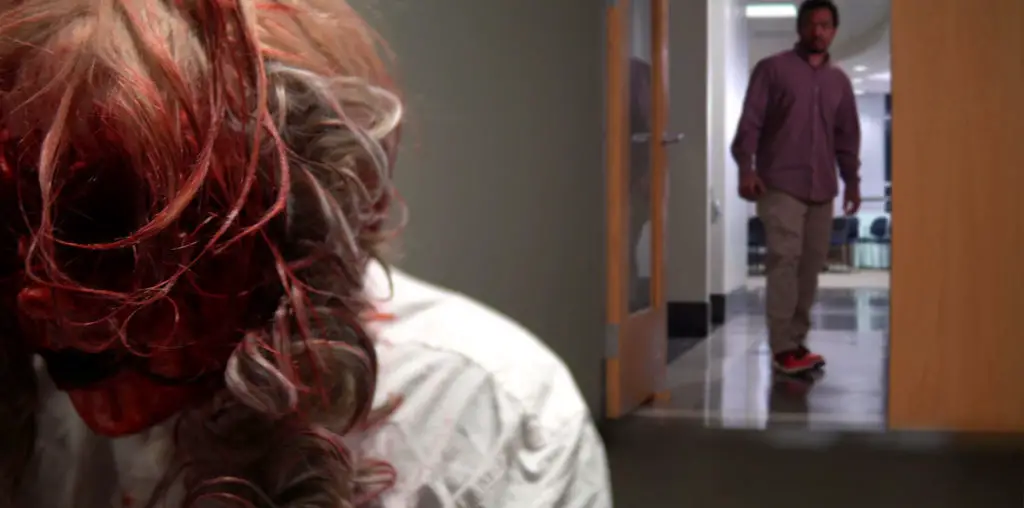
There’s no doubt that the 1960 crime caper “Ocean’s Eleven” has maintained a lasting reputation over the years–but oddly enough, it’s one that has precious little to do with the quality of the film and a whole lot to do with it being a vehicle for the ultimate hipster clique, the Rat Pack: Frank Sinatra, Dean Martin, Sammy Davis Jr., Peter Lawford, Joey Bishop. Steven Soderbergh’s 2001 take on the film boasts a cast similarly bursting with megawatt star power: George Clooney, Brad Pitt, Andy Garcia, Matt Damon, Don Cheadle (who coincidentally played Davis in HBO’s “The Rat Pack”), and Julia Roberts, for a start. Unlike the original, however, Soderbergh’s film will be remembered less for the (inspired) star casting than for being one expertly made piece of pure, unpretentious popcorn entertainment.
The man who gives the film one-half of its title is Danny Ocean (Clooney), who after being paroled from a New Jersey prison wastes no time getting back to his thieving ways. With the help of old friend and associate Rusty Ryan (Pitt), Danny assembles the titular 11-man crew to stage a daring robbery of a vault carrying all the money from three big Las Vegas casinos. All of the splashy resorts (the Bellagio, the Mirage, and the MGM Grand) are owned by suave businessman Terry Benedict (Andy Garcia), who also has in his employ–and affections–Tess (Roberts), Danny’s bitter ex-wife. That romantic angle to “Ocean’s Eleven” comes off as more of an afterthought, a glorified excuse to pair glamour gods Clooney and Roberts on screen. But once the two start spouting screenwriter Ted Griffin’s edgy dialogue, the distraction of seeing Roberts, with all her superstar baggage, taking on such a background role disappears.
As that description of Roberts’ part implies, this side of the story is a secondary one, for the main concern–and what makes the film so much fun–is the planning and execution of the heist. With such a large cast, naturally some characters will be shoved off to the periphery in favor of others (read: the ones played by the higher-profile stars), but it’s a credit to Soderbergh, Griffin, and the actors that these characters make some sort of impression. Mind you, the more supporting parts aren’t exactly the most deep or complex roles (then again, neither are the more prominent ones), but they are nonetheless colorful and are well-matched to the eclectic ensemble. Standing out most are Elliott Gould as a flamboyant business rival of Terry’s seeking revenge; Carl Reiner as an ulcerous retiree brought back into the game; and Bernie Mac as a conning card dealer. Ably filling out the dirty not-quite-dozen are Damon as a green pickpocket; Cheadle as a Cockney explosives expert; Eddie Jemison as the token techno-geek; real-life acrobat Shaobo Qin as the team’s “grease man”; and Scott Caan and Casey Affleck, both perfectly used for once as annoying, dimwitted twin brother drivers. Yet those two, as everyone else in the gang, are pros, and the exceedingly clever and surprising ways in which their grand scheme unfolds makes for riveting viewing. Not that everything is smooth sailing, of course, for with such a quintessentially “only in the movies” group of diverse characters coming together for the job, a number of screw-ups and close calls are bound to occur–which just make the ride that much more enjoyable and exciting.
And that just points up exactly why “Ocean’s Eleven” is such a blast: personality–the personality contribtued by the actors, by Griffin’s smart and funny script, and above all by Soderbergh, who clearly has a ball creating a world of nouveau hipster cool. Once again manning the camera as “Peter Andrews” and aided by ace editor Stephen Mirrione, Soderbergh gives the picture a most appropriate and inviting visual slickness that often leaves the realm of the just plain spiffy (such as the occasional split-screen scene transitions) to downright poetic (as in some late-film shots set against the Bellagio’s famous water show). He also unabashedly embraces the project’s kitsch roots, from the self-deprecating sense of humor to the smooth sounds of David Holmes’ lounge-inflected score.
With “Ocean’s Eleven,” Soderbergh has said that he wanted to “make a movie that has no desire except to give you pleasure from beginning to end.” Had he even halfway succeeded in his goal, the film would have been worthwhile; that he comes so close to completely succeeding (alas, the buzz is a bit blunted by the film going on a scene longer than really needed) illustrates the rare sense of near-total satisfaction that “Ocean’s Eleven” offers–and just how on top of his game Soderbergh is.

